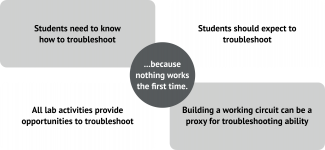The term troubleshooting often refers to the process of repairing a malfunctioning apparatus. In this sense, troubleshooting can be thought of as a type of modeling: the physical apparatus is refined in order to bring its performance into better alignment with expectations that are informed by a model for how the apparatus should perform. Troubleshooting is also a type of problem-solving where the solution state is known but the solution path is unknown: "What’s wrong and how do I fix it?"
However, repairing malfunctioning systems is not the only context in which experimental physicists engage in troubleshooting. Experimental physics research often involves the design and construction of specialized apparatus. As a result, physicists have to troubleshoot their designs. In addition, troubleshooting informs the construction process: we often build complicated systems one subsystem at a time, with testing and troubleshooting happening throughout the construction process. Thus, in the context of experimental physics, the process of troubleshooting is relevant to design, construction, and repair processes.



 The Physics Frontiers Centers (PFC) program supports university-based centers and institutes where the collective efforts of a larger group of individuals can enable transformational advances in the most promising research areas. The program is designed to foster major breakthroughs at the intellectual frontiers of physics by providing needed resources such as combinations of talents, skills, disciplines, and/or specialized infrastructure, not usually available to individual investigators or small groups, in an environment in which the collective efforts of the larger group can be shown to be seminal to promoting significant progress in the science and the education of students. PFCs also include creative, substantive activities aimed at enhancing education, broadening participation of traditionally underrepresented groups, and outreach to the scientific community and general public.
The Physics Frontiers Centers (PFC) program supports university-based centers and institutes where the collective efforts of a larger group of individuals can enable transformational advances in the most promising research areas. The program is designed to foster major breakthroughs at the intellectual frontiers of physics by providing needed resources such as combinations of talents, skills, disciplines, and/or specialized infrastructure, not usually available to individual investigators or small groups, in an environment in which the collective efforts of the larger group can be shown to be seminal to promoting significant progress in the science and the education of students. PFCs also include creative, substantive activities aimed at enhancing education, broadening participation of traditionally underrepresented groups, and outreach to the scientific community and general public.